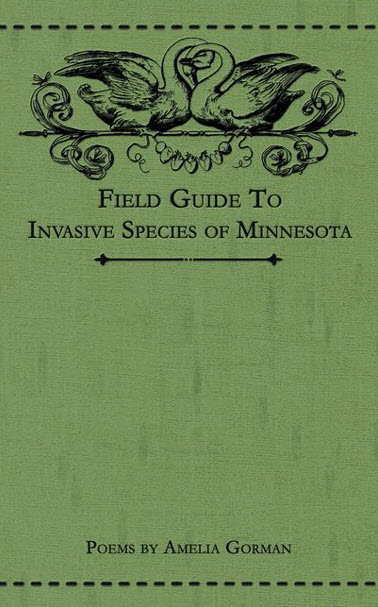| <- Back to main page |
(Interstellar Flight Press)

Drawing inspiration from gardens, rivers, and prairies in the Land of 10,000 Lakes, Amelia Gorman’s Field Guide to Invasive Species of Minnesota is a tender collection of poetry that lingers long after finishing the afterword. Each of Gorman’s 21 poems is named for a non-native species in the state, as the collection’s title suggests. A sketch of the eponymous species accompanies each poem as well, adding a unique touch and giving the book a natural history feel.
Make no mistake, though: Field Guide is no science textbook. While Gorman’s poems invite ecological and sustainability questions, they are also filled with wistfulness, romanticism, and grief.
In “Norway Maple”, Gorman expresses no love for nostalgia but still finds comfort in shared experiences after receiving bad news:
How funny–
I grew up across the street from you
and the paper mill,
it closed before I could work there.
Now you and I tolerate pollution
as well as the trees
only a few tar spots on our lungs…
Gorman gets even more personal in “Mute Swan”, capturing intimacy through a unique, musical lens:
You’re the cello in this piece?
I was a cello, too.
Let’s speak in music instead
and splash pianos on each other…
…half this lake for you and
half for me
love.
It’s not all doves and roses, though. These are poems about invasive species, remember?
With Gorman’s environmental bent, it’s unsurprising that many of the poems touch on dystopia. “Sea Lamprey” in particular asks the question of where humanity will go once we run out of room here on Earth: to the stars, to the sea, or underground? She doesn’t leave us with heavy pessimism, however, as “Silver Carp” imagines a future—2045, to be exact—where humans have learned to adapt, finding ways to better exist in their environment rather than in spite of it.
This is the overall feeling that Field Guide evokes: cautious hope. Gorman acknowledges the climate situation that we currently find ourselves in, but she also imagines a future that is still beautiful, giving a promise at the end of “Starry Stonewort”:
You will be nervous, you will have the
shakes, you will shiver under fever
blankets. If you persevere, you will gain
the world.
As with the rest of the pieces, the promise is not without hardship; this is, after all, a collection about learning to live in a place that is not one’s home.
Gorman’s poems, and this collection as a whole, are short, but they’re far from simple, combing experiences to see what comes up, digging at the roots of being human. This book is one to read slowly, deliberately, looking out at whatever species are out your window and seeing what they have to say.
- Jordan Hirsch